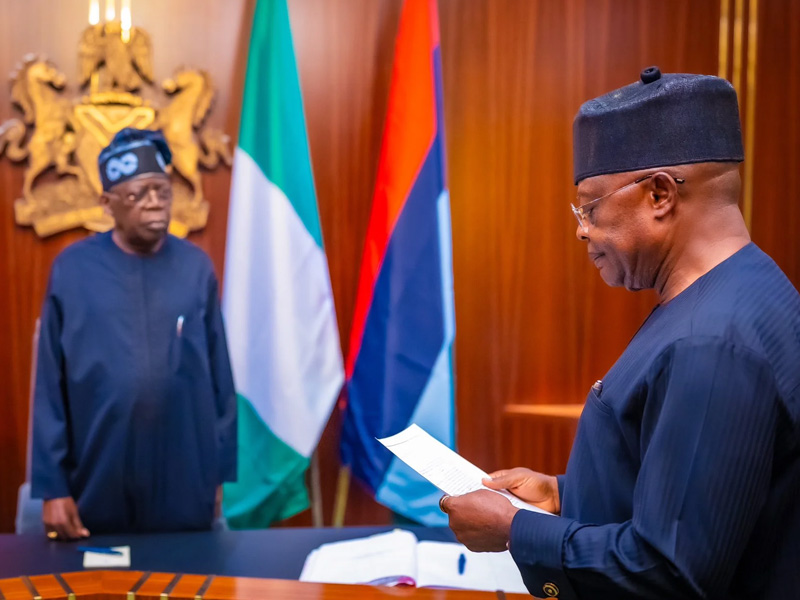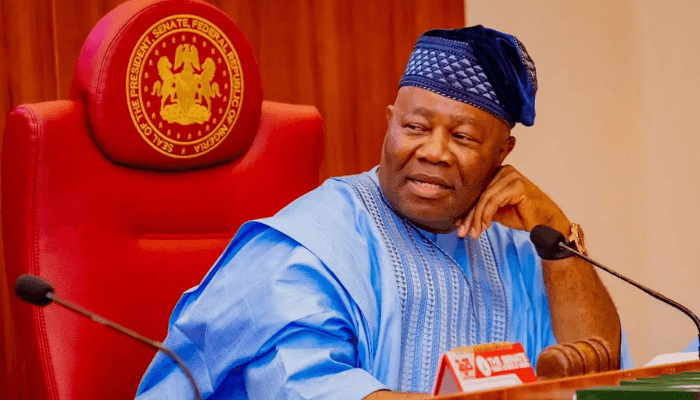A New Chapter for Rivers State
In a decisive move to address the escalating political crisis in Rivers State, President Bola Ahmed Tinubu on Wednesday, March 19, 2025, swore in retired Vice Admiral Ibok-Ete Ibas as the Sole Administrator of the state. The swearing-in ceremony, held at the State House in Abuja, marks a pivotal moment in the federal government’s intervention to restore stability in the oil-rich state. The event was attended by high-ranking officials, including the Chief of Staff to the President, Femi Gbajabiamila, and the Attorney-General of the Federation, Lateef Fagbemi.

The Swearing-In Ceremony: A Formal Handover of Power
The ceremony, conducted with solemnity and precision, symbolized the formal transfer of administrative authority in Rivers State to Vice Admiral Ibas. President Tinubu, in his address, reiterated the necessity of the state of emergency, emphasizing that the decision was made in the interest of the people of Rivers State and the nation at large.
“This is not a decision taken lightly, but one borne out of the need to restore peace, order, and good governance in Rivers State,” Tinubu stated. “Vice Admiral Ibas brings a wealth of experience and leadership to this role, and I am confident that he will steer the state toward stability and progress.”
Vice Admiral Ibas, in his acceptance speech, pledged to prioritize the restoration of peace and the protection of lives and property. “I am deeply honored by this appointment and the trust placed in me by Mr. President. My focus will be on restoring normalcy, ensuring security, and fostering unity among the people of Rivers State,” he said.
The State of Emergency: A Controversial Decision
The swearing-in of Ibas follows President Tinubu’s declaration of a state of emergency in Rivers State on Tuesday, March 18, 2025. The decision, which suspended Governor Siminalayi Fubara, his deputy, Ngozi Odu, and all members of the Rivers State House of Assembly for six months, has sparked widespread debate and criticism.
Tinubu cited constitutional breaches, security threats, and the breakdown of governance as the primary reasons for the declaration. “The political instability in Rivers State has reached a point where extraordinary measures are required to restore order and protect the interests of the people,” he explained during his nationwide broadcast.
Ibas’s Background: A Seasoned Leader
Vice Admiral Ibok-Ete Ibas brings a distinguished career in public service to his new role. He served as the Chief of Naval Staff from 2015 to 2021 under former President Muhammadu Buhari, during which he oversaw significant reforms in the Nigerian Navy. His experience in leadership and crisis management makes him a strong candidate to navigate the complex political landscape of Rivers State.
However, his appointment has been met with mixed reactions. While some have praised his credentials and expressed hope for a return to stability, others have criticized the move as an overreach of executive power and a threat to democracy.
The Crisis in Rivers State: A Power Struggle
The declaration of a state of emergency comes after months of political turmoil in Rivers State, fueled by a power struggle between Governor Siminalayi Fubara and his predecessor, Nyesom Wike, who currently serves as the Minister of the Federal Capital Territory. The crisis has led to protests, violence, and a breakdown of governance, with the state legislature rendered non-functional due to the demolition of its complex.
The federal government’s intervention aims to address the root causes of the crisis and restore peace and order. However, the suspension of elected officials and the appointment of a sole administrator have raised concerns about the implications for democracy and the rule of law.
Mixed Reactions: A Nation Divided
The swearing-in of Ibas has sparked a wave of reactions across Nigeria, with opinions split along political lines. Supporters of the All Progressives Congress (APC) have defended the decision, arguing that it was necessary to address the escalating crisis in Rivers State. They point to the breakdown of governance and the threat to national security as justification for the emergency measures.
On the other hand, opposition leaders and civil society groups have condemned the move, describing it as an attack on democracy and an overreach of executive power. The Peoples Democratic Party (PDP) has rejected the declaration, accusing Tinubu of attempting to impose an undemocratic rule in Rivers State.
The Road Ahead: Challenges and Opportunities
As Vice Admiral Ibas assumes his new role, he faces the daunting task of restoring stability and addressing the root causes of the crisis. His priorities will include ensuring security, fostering dialogue among stakeholders, and rebuilding trust in governance. The success of his administration will depend on his ability to navigate the complex political landscape of Rivers State and win the support of its people.
The federal government’s intervention also raises critical questions about the future of democracy in Nigeria. The coming months will be crucial as Ibas works to restore normalcy and pave the way for a return to democratic governance in Rivers State.
A Test for Nigeria’s Democracy
The swearing-in of Vice Admiral Ibas as the Sole Administrator of Rivers State marks a new chapter in the federal government’s efforts to address the crisis in the state. While the move has been met with controversy, it underscores the urgency of restoring peace and stability in a region critical to Nigeria’s economy and security.
Read also: “Rivers Sole Administrator, Ibas Meets Tinubu at Presidential Villa Amid State of Emergency”
As the nation watches and waits, the hope is that this intervention will lead to a peaceful resolution of the crisis and a brighter future for the people of Rivers State. For now, the focus remains on Vice Admiral Ibas and his ability to steer the state toward stability and progress.
















Got a Questions?
Find us on Socials or Contact us and we’ll get back to you as soon as possible.